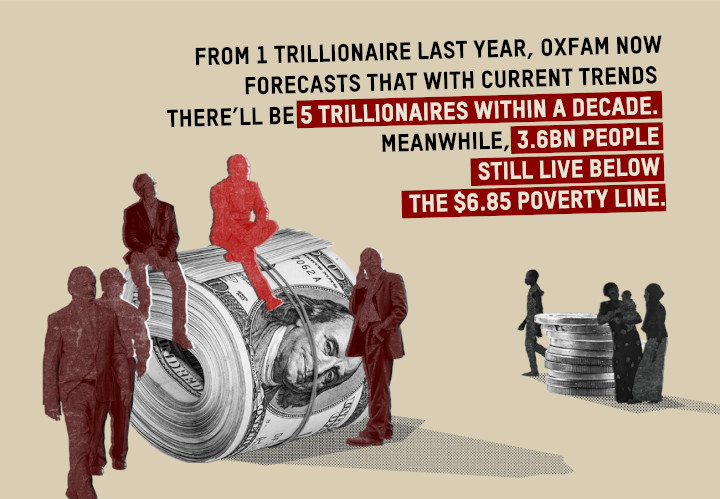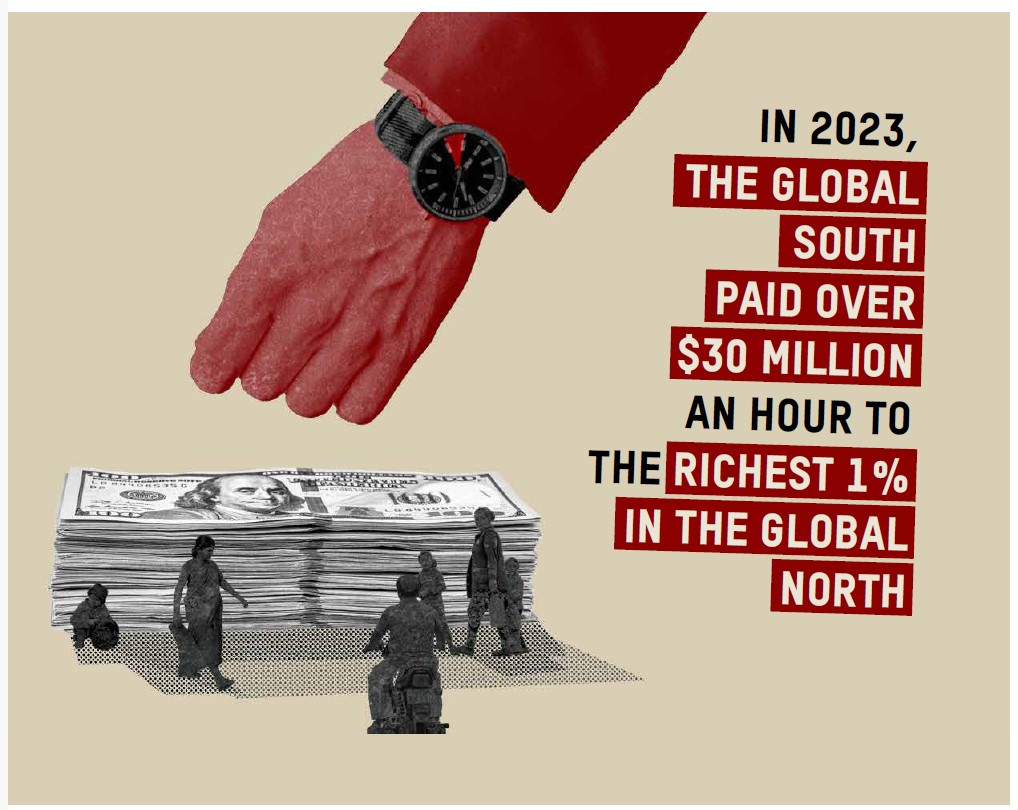

The world looks set to see five trillionaires within a decade — and more billionaires are now being created through inheritance than entrepreneurialism. Anjela Taneja and Harry Bignell introduce Oxfam’s 2025 Davos report, which reveals the scale of unearned wealth — and how those riches are built on a colonial legacy of exploitative global systems.

Remember last year when Oxfam said we would soon see the world’s first trillionaire? Well, our new calculations suggest that the world is now on course for no less than five trillionaires within a decade. And while the super-rich continue to amass unimaginable wealth, our new report for Davos 2025 shows how simultaneously the number of people living in poverty is stagnating – in fact it has remained virtually unchanged since 1990.
This year’s report demonstrates the extent to which our global economy is skewed, as the super-rich profit at the expense of the rest. We are now seeing almost four new billionaires every week, with the wealth of the richest growing three times faster in 2024 than in 2023. But behind these remarkable numbers are two crucial themes:
- The super-rich today are takers, not makers. In other words, their wealth is generally not earned on merit but built on inheritance, cronyism, corruption and monopoly. They enjoy the fruits of all our labour; and
- Billionaire wealth is built on colonialism. That means both the historic plunder of empires and slavery that extracted trillions, and the living legacy of that era in modern-day colonialism: unjust global economic systems, racial and gender hierarchies and other inequities baked into the global world order that have their origins in the formal colonial era. Sixty years after the end of the formal colonial period, we spell out how our global economy still channels wealth from Global South to North, and specifically from ordinary people in the South to the richest in the North.

How inheritance, cronyism and monopoly drive extreme wealth
Last year was a bumper year for billionaires, with over 200 new billionares created. Our report sets out how inheritance, cronyism and monopoly are driving those fortunes.
In 2023 – for the first time – more new billionaires got rich through inheritance than through entrepreneurship. In fact, all of the world’s billionaires younger than 30 inherited their wealth. The next three decades will see over 1,000 of today’s billionaires transfer more than US$5.2 trillion to their heirs. Oxfam calculates that 36% of billionaire wealth is now derived from inheritance.
And much of the wealth of the ultra-rich is not about what you know, but who you know: who you lobby, who you entertain, or whose campaign you finance. In short, much extreme wealth is the product of crony connections between the richest and governments. Oxfam calculates that 6% of billionaire wealth is from crony sources.
Monopoly power is also escalating extreme wealth and inequality worldwide. Monopolistic corporations can control markets, set the rules and terms of exchange with other companies and workers, and set higher prices without losing business. These strategies drive up the wealth of their billionaire owners. We calculate that 18% of billionaire wealth is from monopoly power.
How extreme inequality is rooted in both the colonial past and in today’s modern-day colonial systems
A central theme of the report for this week’s Davos summit is how ours truly is the age of billionaire colonialism. People who are wealthy today benefit not just from a history of brutal wealth extraction, but also from modern systems and structure that continue to transfer wealth from Global South to North. The result is that most billionaires (68%, who hold 77% of total billionaire wealth) live in the rich countries of the North, despite these being home to just one-fifth of the global population.
The extracted wealth and riches from slavery and empire flowed mainly to European powers in the Global North. Colonisers subjected people to violence, enslavement, forced labour on white settlers’ and multinationals’ plantations, killings and extermination. In the Americas, for example, European colonisation, wiped out 90% of Indigenous peoples, reducing the global population by 10%. Colonial powers also extracted what experts today say amount to trillions from enslaved peoples (see a range of estimates in our report). For instance, it is estimated that 40% of Dutch economic growth in the 1770s can be traced to slavery and the slave trade.
Oxfam calculates that between 1765 and 1900, the richest 10% in the UK extracted wealth from India alone worth US$33.8 trillion in today’s money. This would be enough to carpet the surface area of London in £50 notes almost four times over.
The main beneficiaries of such colonial extraction were the richest and the ruling classes in colonising countries, many of which were themselves highly economically unequal. For example, in Britain in 1820, the income share of a person in the richest 1% was 75 times that of a person in the poorest 50%. By 1900, when the British empire was at its height, the gap was 107 times greater.
A core argument of the report is about how the repercussions of that colonial era are still felt today. That’s not just in our financial systems but in profound social-economic and political legacies that continue to shapes lives and entrench divisions around the world. The era fundamentally reconfigured social structures, weaponising characteristics such as race, gender and class to reinforce systems of extraction and oppression.
The legacy of this can be seen in wages in the Global South that are between 87% and 95% lower than wages in the North for work of equal skill. It is time to amplify the voices of those who have called for action to address this legacy of colonialism.
The colonial legacy of global institutions, the financial sector and trade
The report sets out how today’s global economic system reflects and perpetuates inequalities that can be traced back to the colonial era, disadvantaging poorer nations and the poorest people within countries. Key pillars of a system that is delivering enormous and ongoing transfer of wealth from the Global South to the North include:
- Global North control of the increasingly dominant financial sector and global currencies. The report reveals how a rigged global financial system (which provides lower borrowing costs in the Global North) benefits Global North financial actors. For example, in the first quarter of 2024, central banks globally held around 58.9% of their allocated reserves in US dollars. Oxfam calculates that this imbalance alone leads to a payment of almost US$1 trillion dollars a year from the Global South to the North, of which US$30 million an hour is being paid to the richest 1% in rich countries.
- Unequal power in the institutions that govern our world The World Bank and the International Monetary Fund (IMF) hold huge power of the economies of low and middle-income countries, yet the latter have little say in how they are run. G7 countries still hold 41% of the votes in the IMF and World Bank despite having less than 10% of the world’s population. For every vote the average person in the Global North has in the World Bank and IMF, the average person in the Global South has only one-eighth of a vote; the average South Asian has only one-twentieth; in the IMF, a British person’s vote is worth 41 times more than a Bangladeshi’s vote.
- Global trade and investment regimes weighed against the Global South Global South countries often continue to find themselves locked into export-oriented economies that depend on producing raw materials or low-cost goods for markets in the North: a system that was created by colonialism.

A world that taxes unearned privilege and repairs historic wrongs
How can we start to fix a system that perversely rewards unjust amassing of wealth and historic crimes, while penalising the poorest, particularly in the Global South? The report calls on global leaders to take immediate action in six areas.
- Radically reduce inequality – setting global and national goals to do so. for example, aiming for the total income of the richest 10% to be no more than the total income of the poorest 40%.
- Repair the wounds of historical colonialism. Former colonial governments must acknowledge and formally apologise for the full range of crimes and bear the cost of reparations.
- End systems of modern-day colonialism. The IMF, the World Bank, the UN and other global institutions should completely change their governance to end the formal and informal dominance of the Global North and the interests of their wealthy elites and corporations.
- Tax the richest to end extreme wealth. Global tax policy should be harmonised under a new UN tax convention and facilitate the payment of higher taxes by the richest people and corporations.
- Promote South-South cooperation and solidarity. Global South governments should form alliances that promote economic independence and reduce reliance on former colonial powers or Global North economies, as well as demand reforms in international institutions.
- End formal colonialism in all forms. All remaining non-self-governing territories must be supported to realise their rights to equal rights and self-determination.
Anjela Taneja is Public Service Policy and Advocacy Lead at Oxfam International and was commissioning manager and co-author of the 2025 Davos Paper.
Harry Bignell is the Project and Publication Manager of the 2025 Davos paper and campaign.
This is the first in a series of blogs for Davos 2025. Catch up on all our Davos blogs here and follow us on BlueSky, Twitter/X and LinkedIn for the latest Davos content. And join our campaign to tax the super-rich here.
Read the full report for this year’s Davos summit: Takers Not Makers: The unjust poverty and unearned wealth of colonialism. And you can also read the full methodology note for the report.
This blog has also been posted on Views and Voices and Equals. Subscribe to the Equals Substack for more on the Davos report and inequality.
I like your reporting of the problem. So what! What can we, humble middle class folk, help to do about it?
Thanks for your comment, Gary – really pleased you enjoyed the blog!
It’s a great question – on an individual level, we are calling on people to join our Fight For a Fairer Future Campaign focused on taxing the super-rich. You can do this here: https://www.oxfam.org.uk/get-involved/campaign-with-oxfam/tax-the-super-rich/
You can also sign up to our Equals newsletter to stay in the loop on all things Oxfam and Inequality: https://www.equals.ink/
In terms of the shifts we need to see in the world – we’ve pulled together this brief explainer on our report recommendations: https://www.instagram.com/p/DFIitf9NgsW/?igsh=dW1yNzJobGVzY2Fw. If you find our content engaging, please do share it with your friends, colleagues and family members.
Thanks, Gary!